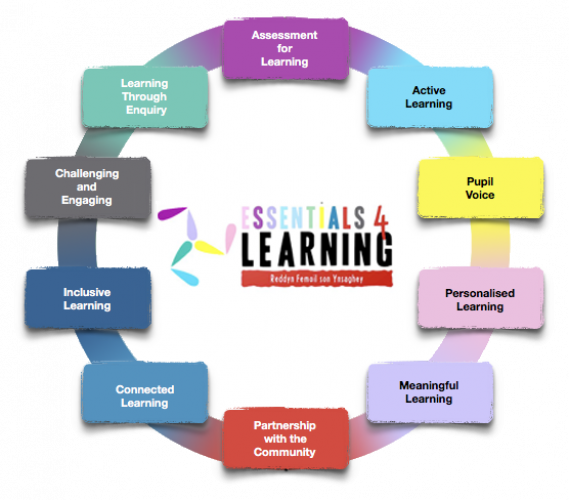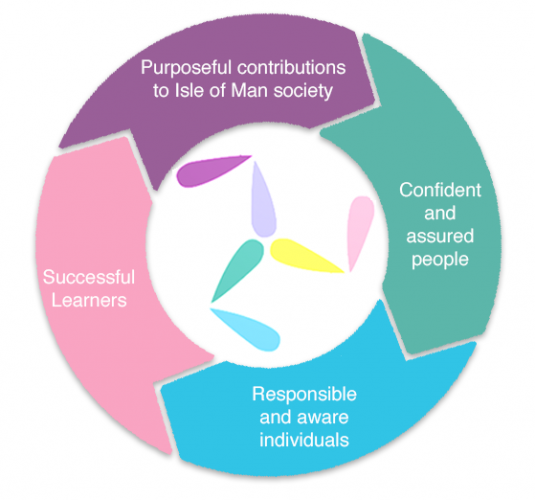
The ten principles of the IOM Essentials for Learning Curriculum (E4L) underpin the St Mary's School Curriculum.
St Mary’s curriculum is broad and balanced; it builds knowledge, encourages independence, curiosity and creativity; produce collaborators, innovators, leaders and, above all, it helps our children to understand what it means to be human.
Early Years Curriculum
We follow Development Matters to support children’s learning and development, by closely matching provision to a child’s current needs. We were an early adopter school for the new EYFS curriculum 22-23.
The EYFS curriculum is engaging hands-on learning and a child-centred that ensures the consistent development of skills across all areas of learning. Children are encouraged to explore, take risks, and form positive relationships with their peers in a setting that celebrates the uniqueness of every child.
Key Stage 1 and 2
The curriculum is knowledge rich. All aspects of the curriculum have been designed with progression in mind; this ensures that children build on existing skills and knowledge, which, over time, enables them to know more and remember more.
Integral to the curriculum is P4C and Thinking Moves. P4C underpins our caring and questioning ethos. Children learn to listen to and respect one another, and challenge and explore the beliefs and values of others. They develop their own views and make more deliberate and responsible judgements. P4C is taught explicitly in a weekly session from Reception to Year 6.
The curriculum focuses significantly on the core areas of Reading, Writing, Talking and Listening, which are delivered through the projects.
History, Geography, RE and Art are delivered using a mastery model where children can explore content in increasing depth and complexity as they move through school. Propositional and procedural knowledge are developed through termly projects that are framed with a philosophical enquiry question. This approach allows us to make connections across the curriculum, whilst also developing the children’s understanding of what makes each subject distinct and unique.
Curriculum planning: Pedagogy
The curriculum provides inspirational learning opportunities for all children. Curriculum planning ensures that children are immersed in exciting projects which lead to authentic outcomes. They are challenged to work creatively whilst deepening their knowledge and understanding across the curriculum.
Planning begins with content. From this we identify philosophical concepts that will be drawn out and explored through individual subjects. We select and explore concepts that matter the most to our children.
The philosophical concepts are framed with an enquiry question and often begin with the children exploring scripture or a literacy text.
All our projects are knowledge rich, aspirational and contextualised. Children work towards authentic outcomes and engage with critical audiences; they undertake projects that involve complex issues, and in doing so, develop an understanding of what is possible and a belief that they can make a difference.
We have high expectations of learning and outcome. Our curriculum is designed to encourage high levels of motivation, which, when combined with the process of critique and redrafting, ensures that our children are instilled with the desire to produce beautiful work.
Children work alongside experts and professionals, take part in visits and educational visits and learn both indoors and out. Our classroom environments are designed to encourage children to work collaboratively, flexibly and with high levels of independence.
Curriculum coverage is coherently planned for. Each year group have projects which can be used when single age classes or mixed aged.
Curriculum Progression:
Our curriculum comprises of four interrelated strands of knowledge:
Procedural knowledge: Knowledge is vertically integrated so that the children revisit and deepen their knowledge and understanding in each year group as they progress through school. In planning, this knowledge is presented as our broad ‘learning aims’. This process is supported using SOLO taxonomy, which enables the children to deepen their knowledge and understanding within year groups ensuring a mastery approach to curriculum.
Disciplinary knowledge: Disciplinary knowledge represents the methods or conceptual frameworks. We present these as ‘Big ideas’ that masters of their subjects apply when viewing their subject.
Substantive knowledge: Substantive knowledge represents the content that is taught in each year group – in planning, this knowledge is presented as specific ‘learning outcomes’ – the content we want the children to know and remember. In selecting the specific content, we ensure that the heritage of our children is highlighted and celebrated. As a result of our work on developing a fully inclusive, deliberate choices are made about aspects so that our curriculum is representative of, and sensitive to, the community that we serve.
Substantive concepts: Substantive concepts are specific terms that often don’t have a fixed meaning, and as a result, are context dependent. Substantive concepts appear throughout each subject in the curriculum and are explored in different year groups through different aspects. By highlighting these concepts, we ensure that connections are made so that children begin to develop familiarity and confidence, which then supports their future learning within the subject.
Repetition and retrieval: Our curriculum is built upon high levels of repetition to ensure that our children can do more and remember more as they progress through school. The two strands of Procedural knowledge (SOLO Taxonomy) and Disciplinary knowledge are revisited and developed in every class from year one to year six. This repetition ensures that our children reach the end of Key Stage Two with the ability to apply the skills and conceptual frameworks with high levels of independence.
Substantive concepts are repeated in multiple year groups in order to develop resonance. Concepts are unpicked, defined and put into context to support the children’s immediate understanding of the area being studied, whilst also broadening their wider understanding of the subject.
Throughout each project, we share significant amounts of substantive knowledge with our children. In planning, our specific learning outcomes detail the substantive knowledge that we want the children to know and remember. Retrieval practice is used during the course of the project to ensure that key knowledge is revisited and remembered.
The curriculum offer is inclusive for all learners due to its enquiry approach and the universal approach to learning across the school.

